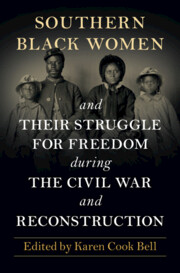Book contents
- Southern Black Women and Their Struggle for Freedom during the Civil War and Reconstruction
- Southern Black Women and Their Struggle for Freedom during the Civil War and Reconstruction
- Copyright page
- Dedication
- Contents
- Figures
- Tables
- Contributors
- Acknowledgments
- Introduction
- Part I Emancipation and Black Women’s Labor
- Part II War, Gender Violence, and the Courts
- 4 Black Women, War, and Freedom in Southern Louisiana and Low Country Georgia
- 5 Rape and Mutiny at Fort Jackson
- 6 “I Told Him to Let Me Alone, That He Hurt Me”
- Part III Emancipation, the Black Family, and Education
- Notes
- Index
5 - Rape and Mutiny at Fort Jackson
Black Laundresses Testify in Civil War Louisiana
from Part II - War, Gender Violence, and the Courts
Published online by Cambridge University Press: 14 December 2023
- Southern Black Women and Their Struggle for Freedom during the Civil War and Reconstruction
- Southern Black Women and Their Struggle for Freedom during the Civil War and Reconstruction
- Copyright page
- Dedication
- Contents
- Figures
- Tables
- Contributors
- Acknowledgments
- Introduction
- Part I Emancipation and Black Women’s Labor
- Part II War, Gender Violence, and the Courts
- 4 Black Women, War, and Freedom in Southern Louisiana and Low Country Georgia
- 5 Rape and Mutiny at Fort Jackson
- 6 “I Told Him to Let Me Alone, That He Hurt Me”
- Part III Emancipation, the Black Family, and Education
- Notes
- Index
Summary
Crystal Feimster examines the Black soldiers of the 4th Regiment of the Native Guard (also known as the Corps dAfrique) stationed at Fort Jackson, Louisiana, and the laundresses who served them and their white officers. Both Black soldiers and laundresses were formerly enslaved people who had seized their freedom by joining and aiding the Union cause. Over the course of six weeks, in December 1863 and January 1864, they engaged in open munity to protest racial and sexual violence inflicted by White Union officers. In so doing they made visible the violent terms of interracial interaction that informed the meaning of wartime freedom and Black labor (terms that were still very much rooted in the prisms and discourses of enslavement). More importantly, as free labor, Black women began to negotiate a deeply abusive racial and sexual terrain.
- Type
- Chapter
- Information
- Southern Black Women and Their Struggle for Freedom during the Civil War and Reconstruction , pp. 80 - 98Publisher: Cambridge University PressPrint publication year: 2023

